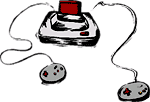|
June 15, 2003
Grand Theft Auto 3 -- Half-Life --
Counter-Strike -- Crazy Taxi -- Team Fortress Classic -- OO7 --
Spider-Man
Halo -- Marvel vs Capcom -- Roguespeare -- Super Mario
Cart
 Do you recognize these titles? They are all action
video games. These games were played by college students in experiments
to see how video games affect visual skills. Researchers C. Shawn Green
and Daphne Bavelier at the University of Rochester (New York) had students
play action video games at least four days a week (minimum of one hour
each day) for six months. After this training, the students' visual
skills were tested. Do you recognize these titles? They are all action
video games. These games were played by college students in experiments
to see how video games affect visual skills. Researchers C. Shawn Green
and Daphne Bavelier at the University of Rochester (New York) had students
play action video games at least four days a week (minimum of one hour
each day) for six months. After this training, the students' visual
skills were tested.
 Students who were trained playing action video games
had better visual skills and visual attention than students who had little
or no video game playing experience. Video game players tracked objects
better, reacted faster and located visual targets better than non-players. Students who were trained playing action video games
had better visual skills and visual attention than students who had little
or no video game playing experience. Video game players tracked objects
better, reacted faster and located visual targets better than non-players.
 In a separate experiment, the visual skills of students who
played 10 hours (1 hour/day) of an action video game (Medal of
Honor) were compared to those of students who played 10 hours (1
hour/day) of a non-action video game (Tetris). On all tests
of visual skill, the action video game players scored better than the
non-action video game players. In a separate experiment, the visual skills of students who
played 10 hours (1 hour/day) of an action video game (Medal of
Honor) were compared to those of students who played 10 hours (1
hour/day) of a non-action video game (Tetris). On all tests
of visual skill, the action video game players scored better than the
non-action video game players.
 The researchers believe that action video games force players to
"simultaneously juggle a number of varied tasks (detect new enemies, track
existing enemies and avoid getting hurt, among others)." Such demands may
result in brain changes that improve visual skills. It is possible that
action video games could be used in treatment programs to help people with
visual problems. These games might even be used to teach people to drive,
monitor radar or operate air traffic control equipment.
The researchers believe that action video games force players to
"simultaneously juggle a number of varied tasks (detect new enemies, track
existing enemies and avoid getting hurt, among others)." Such demands may
result in brain changes that improve visual skills. It is possible that
action video games could be used in treatment programs to help people with
visual problems. These games might even be used to teach people to drive,
monitor radar or operate air traffic control equipment.
Smart kids might use the results of these experiments the next time they
hear their parents say, "Stop playing those games!" Perhaps these kids
will answer, "Just a little more...I'm improving my visual skills and
training to be an air traffic controller."
| 

 NOTE: some of the video games used
in these experiments have extensive violent content. For example,
Grand Theft Auto 3, Halo, and Half-Life all have "Mature" ratings
that indicate these games are appropriate for people 17 years and
older.
NOTE: some of the video games used
in these experiments have extensive violent content. For example,
Grand Theft Auto 3, Halo, and Half-Life all have "Mature" ratings
that indicate these games are appropriate for people 17 years and
older.![[email]](./gif/menue.gif)



